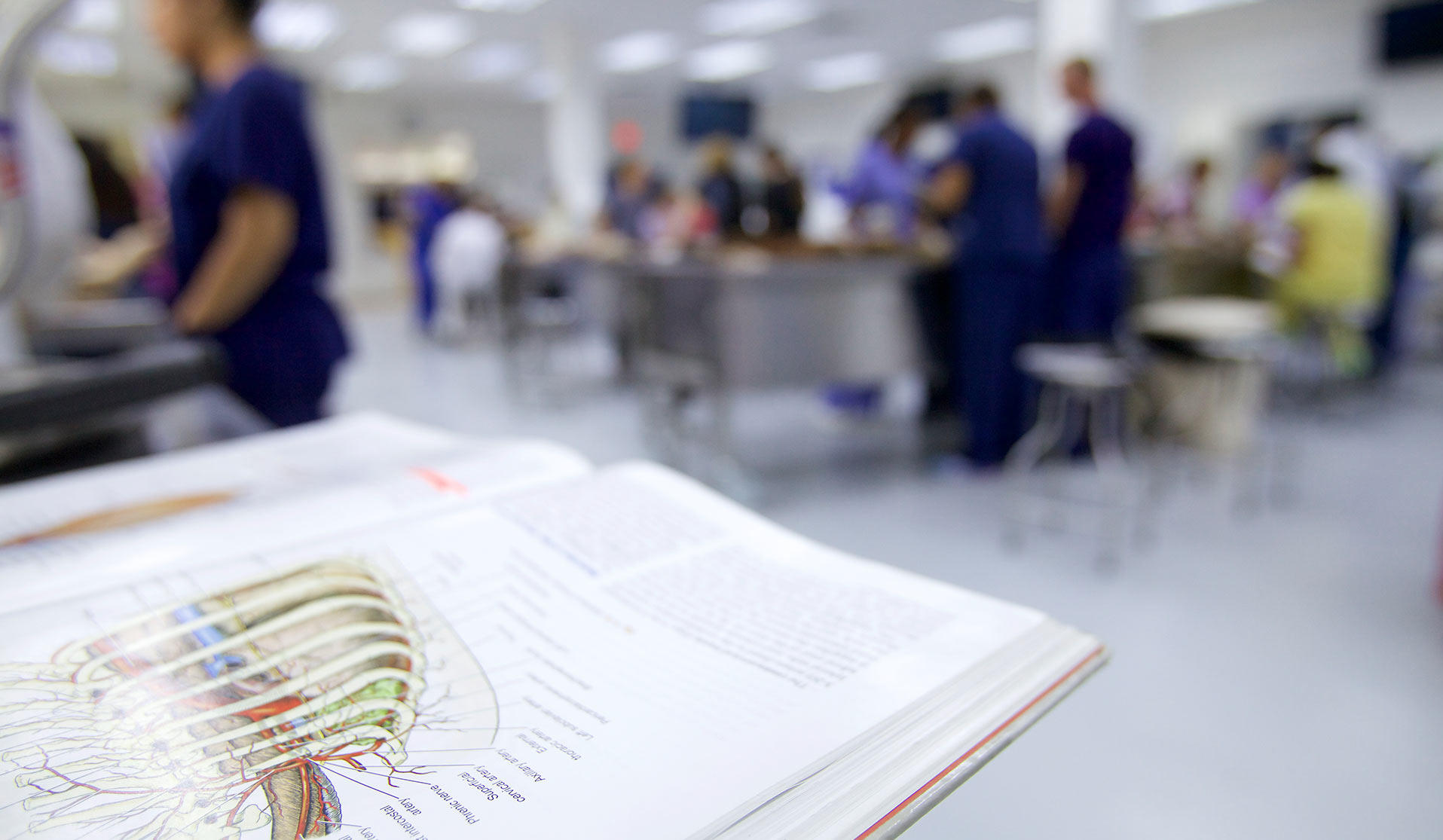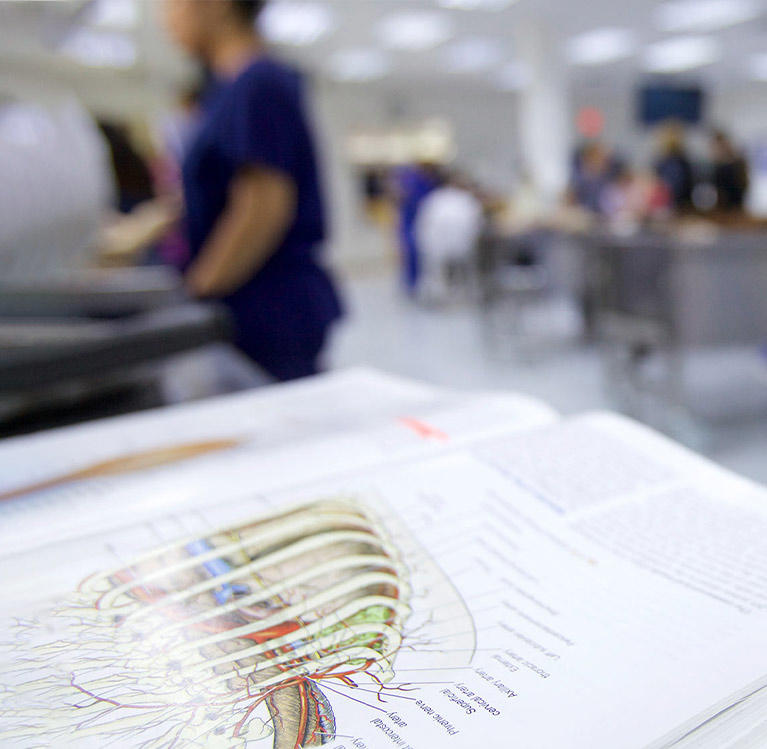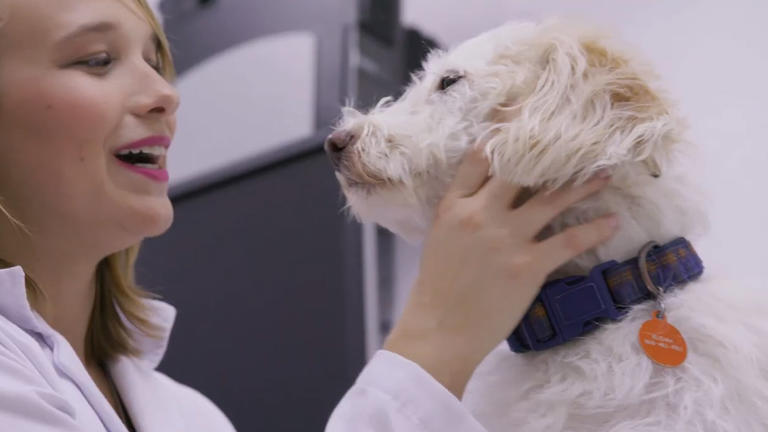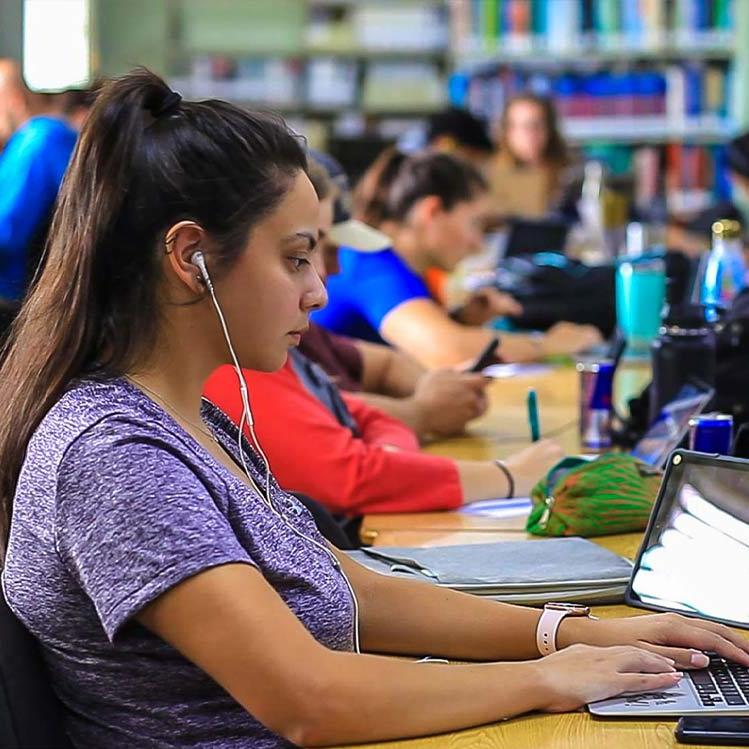ROSS VET DVM CURRICULUM
Classroom to Clinicals. The Ross Vet Doctor of Veterinary Medicine (DVM) curriculum can prepare you for lifelong career success as today’s veterinarians and tomorrow’s leaders. You will participate in a dynamic learning experience that emphasizes clinical communication skills, hands-on experiential learning, innovative instructional technology, and content that reflects current veterinary education topics and trends.
The DVM degree is awarded upon the successful completion of our 10-Semester preclinical and clinical DVM curriculum.
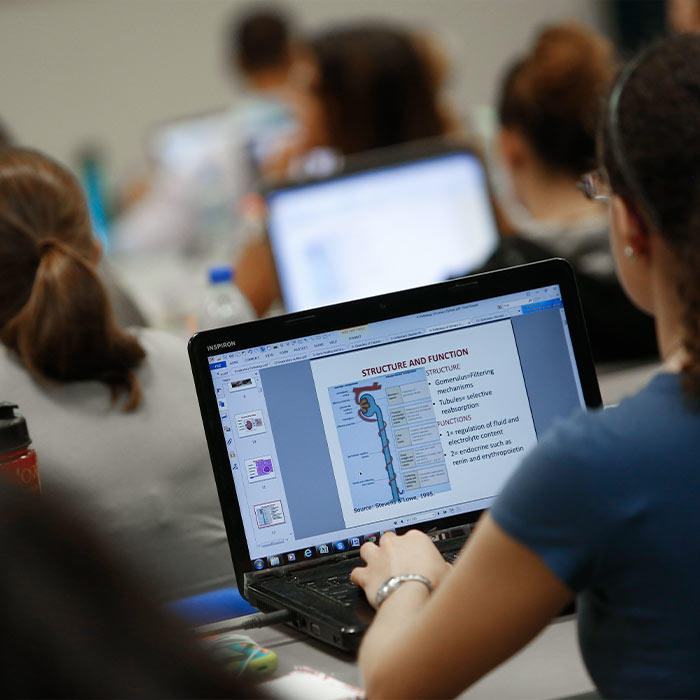
Our vet school curriculum provides clinical correlation and examples of clinical relevance throughout the instructional program. As early as the first semester, our Clinical Skills and Simulation labs offer you the opportunity to practice and acquire basic veterinary skills using models. Use of models allows you to practice both in labs and at home. Our faculty and instructors provide continuous feedback, helping you work towards proficiency and improve your confidence.
See our Academic Catalog for a complete list of courses and course information.
CORE CURRICULUM
Please refer to the academic catalog for the most up-to-date curriculum information and courses.
| Semester | Course No. | Course Title | Credits |
|---|---|---|---|
| One | VMI 5102 | Veterinary Professional Foundations I | 1 |
| One | VMI 5112 | Essential Veterinary Skills 1 | 1 |
| One | VMS 5111 | Microscopic Anatomy and Embryology | 3.5 |
| One | VMA 5113 | Gross Anatomy I | 4 |
| One | VMA 5114 | Principles of Infectious Diseases | 2 |
| One | VPP 5123 | Physiology I | 4 |
| One | VMR 5132 | Principles of Veterinary Research | 1 |
| Two | VMI 5212 | Essential Veterinary Skills 2 | 1 |
| Two | VMA 5216 | Gross Anatomy II | 4 |
| Two | VPP 5223 | Physiology II | 4 |
| Two | VMP 5253 | Immunology | 3 |
| Two | VMP 5265 | Parasitology | 3.5 |
| Two | VMP 5252 | Clinical Reasoning Skills I | 1 |
| Three | VMI 5312 | Essential Veterinary Skills 3 | 1 |
| Three | VPP 5431 | Applied Animal Nutrition | 3 |
| Three | VPA 5341 | Pathology I | 4 |
| Three | VMP 5351 | Bacteriology and Mycology | 3 |
| Three | VPP 5355 | Virology | 3 |
| Three | VMP 5352 | Clinical Reasoning Skills II | 1 |
| Three | VPP 5343 | Pharmacology I | 3 |
| Four | VMI 5412 | Essential Veterinary Skills 4 | 1 |
| Four | VPP 5431 | Applied Animal Nutrition | 3 |
| Four | VPA 5443 | Pathology II | 5 |
| Four | VPA 5448 | Clinical Pathology | 6 |
| Four | VPP 5334 | Pharmacology | 5 |
| Four | VMS 5475 | Veterinary Public Health | 3.5 |
| Five | VMI 5512 | Essential Veterinary Skills 5 | 1 |
| Five | VPP 5538 | Toxicology | 3 |
| Five | VMS 5573 | Diagnostic Imaging | 4 |
| Five | VMS 5577 | Anesthesiology | 4 |
| Five | VMS 5585 | Small Animal Medicine I | 7 |
| Six | VMS 5612 | Essential Veterinary Skills 6 | 1 |
| Six | VMS 5698 | Avian and Exotic Animal Medicine | 2 |
| Six | VMS 5649 | Small Animal Surgery | 4 |
| Six | VMS 5650 | Surgery Laboratory I | 2 |
| Six | VMS 5687 | Small Animal Medicine II | 5 |
| Six | VMS 5690 | Large Animal Medicine I | 5 |
| Seven | VMS 5775 | Theriogenology | 4 |
| Seven | VMS 5783 | Essential Veterinary Skills G | 2 |
| Seven | VMS 5793 | Large Animal Medicine II | 5 |
| Seven | VMS 5795 | Large Animal Surgery | 4 |
| Seven | VMS 5796 | Surgery Laboratory II | 2 |
| Seven | VMI 5704 | Veterinary Professional Foundations II | 1 |
| Seven | VLE 5701 | Licensing Exam Preparation | 2 |
Veterinary Professional Foundations I
Course Number: VMI 5102
Credits: 1
Provides entry-level DVM students with a strong grounding in professional skills. Students will be supported in developing core competencies, which contribute to success as a member of the veterinary profession. Topics include: communication skills, ethical decision-making, professionalism, financial planning, information seeking diversity, and multicultural awareness and goal setting.
Essential Veterinary Skills 1
Course Number: VMI 5112
Credits: 1
A practical course providing multi-species instruction in foundational skills (animal handling and examination, hand skills, communication, professionalism) in a vertically-integrated fashion that builds in complexity over multiple semesters using live animal handling and examination as well as model and simulation-based experiences. Course continues through Semesters 1-6.
Microscopic Anatomy And Embryology
Course Number: VMA 5111
Credits: 3.5
Concentrates on the study of cell biology, cell physiology and the microscopic structure of cells, tissues, and organs of domestic animals. Students use dual-viewing microscopes and digital images in laboratories to study the structure of basic tissue types and their integration into organs and organ systems. The lectures correlate microscopic and gross anatomy with function and development of organ systems. Selected embryology topics focus attention on common developmental anomalies encountered by veterinarians.
Gross Anatomy I
Course Number: VMA 5113
Credits: 4
Focuses on the comparative gross anatomy of domestic animals including canine, equine and ruminant, with minor emphasis on feline and porcine. Laboratories utilize embalmed canine cadavers for dissections. Prosections are used for other species. Also integrated into the course are normal radiographic anatomy, and instrument handling labs. The lectures provide overviews of the main concepts or hard-to-explain details. Topics covered in the first semester include osteology and muscle systems of the limbs, anatomy of the thorax and abdomen and nervous system.
Principles Of Infectious Diseases
Course Number: VMA 5114
Credits: 2
Focuses on the fundamentals of microbiological pathogens and infectious disease principles, in preparation for subsequent courses in bacteriology and mycology, virology, and parasitology. The topics covered will include basic overviews of what defines pathogens as compared to normal flora, virulence components and pathogenicity, host defenses against pathogens, immune evasion strategies of infectious agents, importance of vectors and reservoirs in disease transmission, zoonoses, herd health and preventative strategies, microbial genetics, and clinical microbiology and diagnostic methodologies. Throughout the course, students will be exposed to RUSVM research faculty who actively investigate infectious diseases and can offer additional research opportunities.
Physiology I
Course Number: VPP 5123
Credits: 4
Focuses on neurologic and muscular physiology, with particular emphasis on neurotransmitters, and the behavior of membrane receptors and channels. Cardiovascular physiology, with particular emphasis on the electrical and mechanical activities of the heart, blood pressure and trans-capillary transport; blood, with special emphasis on the formation and function of the formed elements as well as the removal of old and worn out red blood cells from the circulation; coagulation and anti-coagulation mechanisms. Respiratory physiology.
Principles Of Veterinarian Research
Course Number: VMR 5132
Credits: 1
Designed to help students learn about fundamentals of research, including experimental planning and design, research bias, alternatives to animal use and animal welfare, the One Health concept, granting agencies, the components of grant writing and review process, types of research, IACUC, IRB, post-award considerations, how to conduct a research project, analysis of data and interpretation of experimental results, types of data presentations, manuscript preparation, critical evaluation of the scientific literature and on-line resources, and how this knowledge is used in the practice of evidence-based medicine. Students are exposed to active RUSVM research faculty and student research associates throughout the course.
Essential Veterinary Skills 2
Course Number: VMI 5212
Credits: 1
A practical course providing multi-species instruction in foundational skills (animal handling and examination, hand skills, communication, professionalism) in a vertically-integrated fashion that builds in complexity over multiple semesters using live animal handling and examination as well as model and simulation-based experiences. Course continues through Semesters 1-6.
Gross Anatomy II
Course Number: VMA 5216
Credits: 4.5
Continues the Gross Anatomy I course. Comparative gross anatomy of the domestic animals focusing on canine, equine and ruminant as well as the avian species, with minor emphasis on the feline and porcine. Laboratories utilize embalmed canine cadavers for dissections. Prosections are used for other species. Also integrated into the course are normal radiographic anatomy. Topics covered in the second semester include anatomy of the pelvic cavity/reproductive tract, innervation and vasculature of the limbs, anatomy of the head/neck, avian anatomy and a clinical neuroanatomy component.
Physiology II
Course Number: VPP 5223
Credits: 4
Focuses on renal and acid-base physiology; the gastrointestinal system, with emphasis on mechanisms and control of exocrine and endocrine secretions; the endocrine system, with emphasis on regulation of carbohydrate, fat and protein metabolism; and the reproductive system, including pregnancy and neonatal physiology.
Immunology
Course Number: VMP 5253
Credits: 3
Covers basic defense mechanisms, diseases of the immune system and the role of immunity in diseases of domestic animals. Serological and other immunological tests, and their application in laboratory diagnosis of diseases, are covered.
Parasitology
Course Number: VMP 5265
Credits: 3.5
Emphasizes major parasite taxonomic groups by host species. Helminthic, arthropod and protozoan parasites that affect domestic animals in North America are covered. Lectures are organized by host species and stress parasite identification, life cycles, pathogenesis and lesions, clinical signs, diagnosis and prevention and treatment of parasites. Laboratories focus on identification of the parasites and lesions they produce. Lectures and laboratories are integrated to achieve course objectives.
Clinical Reasoning Skills I
Course Number: VMP 5252
Credits: 1
This course provides a forum for building clinical reasoning skills using cases and interactive learning methods. The course continues through semester 4, with each semester focusing on different aspects of the steps in clinical reasoning. This course, in Semester 2, focuses on history taking, developing a problem list and developing a differentials list or hypothesis list.
Essential Veterinary Skills 3
Course Number: VMI 5312
Credits: 1
A practical course providing multi-species instruction in foundational skills (animal handling and examination, hand skills, communication, professionalism) in a vertically-integrated fashion that builds in complexity over multiple semesters using live animal handling and examination as well as model and simulation-based experiences. Course continues through Semesters 1-6.
Applied Animal Nutrition
Course Number: VPP 5431
Credits: 3
This course reviews the basic feed constituents, energy, protein, fiber, minerals and vitamins; concepts in feed labeling; the characteristics of feeds used in animal feeding; animal management; and feeding guidelines for cats, dogs, cattle, small ruminants, horses and swine. The course incorporates real-life case examples and a few out-of-class assignments to reinforce important concepts.
Pathology I
Course Number: VPA 5341
Credits: 4
Introduces the terminology of disease, mechanisms of disease from both causal and tissue-response aspects, systemic pathology based on etiopathogenesis, and gross and microscopic appearance of lesions. Lectures, histopathology slides (real and virtual), necropsies and abattoir specimens are employed.
Bacteriology And Mycology
Course Number: VMP 5351
Credits: 3
Concentrates on diseases in domestic animals caused by pathogenic bacteria and fungi. Lectures emphasize basic properties of microorganisms, including identification and pathogenesis. Laboratory instruction includes basic bacteriology/mycology laboratory techniques, with hands-on application of identifying those organisms in the form of standard staining and microscope techniques, plating of cultures and simple methods of identification of bacteria.
Virology
Course Number: VMP 5355
Credits: 3
Covers the basic properties of animal viruses including classification, genetics, pathogenesis and diagnosis of viral diseases using laboratory methods. Control and prevention of viral diseases are discussed.
Clinical Reasoning Skills II
Course Number: VMP 5352
Credits: 1
This course provides a forum for building clinical reasoning skills using cases and interactive learning methods. The course is a continuation of CRS 1, with each semester focusing on different aspects of the steps in clinical reasoning. Semester 3 (CRS 2) focuses on developing a problem list, developing a differentials list or hypothesis list and interpreting diagnostic test results. The core knowledge area(s) and aspect of clinical reasoning addressed in each session will be highlighted/summarized, when appropriate, to increase awareness of how the knowledge is integrated and used in the reasoning process.
PHARMACOLOGY I (3 CREDITS)
Course Number: VPP 5343
Credits: 3
The course is subdivided in two parts; General principles of pharmacology, including pharmaceutics, drug and regimen selection (pharmacokinetics, pharmacodynamics, dosage/dose/rate of administration calculations), evidence-based medicine principles for lifelong learning, regulations and ethics, communications and drug dispensing, encompassing prescription writing; Clinical pharmacology I, covering antimicrobials (antibacterial, antifungal, and antiviral) and antiparasitics (insecticides, acaricides, anthelmintics, and protozoan treatment).
Topics are covered through didactic lectures and, for some of them, through case/problem-based learning.
Examinations will consist of computer-based questions including weekly block examinations and a final examination graded over a scale of 100; as well as competency-based assessments graded as “PASS” or “FAIL”. To pass Pharmacology I, students need a minimum mean of 70% at the computer-based questions and “PASS” grades to all competency-based assessments.
Essential Veterinary Skills 4
Course Number: VMI 5412
Credits: 1
A practical course providing multi-species instruction in foundational skills (animal handling and examination, hand skills, communication, professionalism) in a vertically-integrated fashion that builds in complexity over multiple semesters using live animal handling and examination as well as model and simulation-based experiences. Course continues through Semesters 1-6.
Applied Animal Nutrition
Course Number: VPP 5431
Credits: 3
This course reviews the basic feed constituents, energy, protein, fiber, minerals and vitamins; concepts in feed labeling; the characteristics of feeds used in animal feeding; animal management; and feeding guidelines for cats, dogs, cattle, small ruminants, horses and swine. The course incorporates real-life case examples and a few out-of-class assignments to reinforce important concepts.
Pathology II
Course Number: VPA 5443
Credits: 5
Continues systemic pathology of food and companion animals. Disorders are categorized by organ system emphasizing etiopathogenesis, gross and microscopic lesions, and sequelae. Lectures, histopathology slides (real and virtual), necropsies and abattoir specimens are employed.
Clinical Pathology
Course Number: VPA 5448
Credits: 6
Students learn how to use laboratory data to make a diagnosis. They are expected to understand the underlying pathophysiology of laboratory abnormalities, understand how tests are selected, the technology used to generate data, and most importantly, how to interpret and integrate test results, including hematology, cytopathology, and clinical biochemistry.
Clinical Reasoning Skills III
Course Number: VPA 5452
Credits: 1
This course provides a forum for building clinical reasoning skills using cases and interactive learning methods. The course is a continuation of CRS 1 and 2, with each semester focusing on different aspects of the steps in clinical reasoning. Semester 4 (CRS 3) focuses on directing history taking, prioritizing problems on the problem list, relating differentials list/hypothesis list to problems, history and diagnostic test selection and interpreting diagnostic test results. The core knowledge area(s) and aspect of clinical reasoning addressed in each session will be highlighted/summarized, when appropriate, to increase awareness of how the knowledge is integrated and used in the reasoning process.
Veterinary Public Health
Course Number: VMS 5475
Credits: 3.5
Provides students with the fundamentals of epidemiologic theory as a means of understanding how epidemiology can be used in veterinary medicine. Introduces the concepts of emerging infectious diseases, bioterrorism and disaster medicine, as well as the epidemiology of various zoonotic diseases. Important aspects of public health such as milk hygiene, humane slaughter, meat inspection and food-borne diseases are also discussed.
Pharmacology
Course Number: VPP 5334
Credits: 4
Focuses on general principles of pharmacology, together with drugs acting on the autonomic and central nervous systems, muscle relaxants, local anesthetics and nonsteroidal anti-inflammatory drugs.
Essential Veterinary Skills 5
Course Number: VMI 5512
Credits: 1
A practical course providing multi-species instruction in foundational skills (animal handling and examination, hand skills, communication, professionalism) in a vertically-integrated fashion that builds in complexity over multiple semesters using live animal handling and examination as well as model and simulation-based experiences. Course continues through Semesters 1-6.
Toxicology
Course Number: VPP 5538
Credits: 3
Studies toxicants and poisonous plants of significance to livestock and companion animals, including their source, properties, toxicity, toxicokinetics, mechanism of toxicologic damage, detection, diagnosis and treatment.
Diagnostic Imaging
Course Number: VMS 5573
Credits: 4
Provides an overview of the physics of diagnostic radiology, the principles of veterinary radiography and quality control of radiographs. Normal radiographic findings and anatomy in small animals plus radiographic features and patterns as they relate to diseases are also covered. An introduction to equine radiography and diagnostic ultrasound is included, along with an introduction to alternate imaging techniques.
Anesthesiology
Course Number: VMS 5577
Credits: 4
Introduces the principles of general and local anesthesia of small and large animals. The etiology, diagnosis and treatment of fluid and acid-base disorders are discussed, as well as the recognition, treatment and prevention of anesthetic emergencies. Laboratory sessions provide students with experience in small animal anesthesia, in addition to demonstrations of monitoring equipment, mechanical ventilation and large animal general anesthesia
Small Animal Medicine I
Course Number: VMS 5585
Credits: 7
Focuses on disorders of the cardiovascular, endocrine and neurological systems as well as selected infectious diseases. The important conditions of dogs and cats are discussed according to their pathophysiology, clinical signs, diagnosis, differential diagnoses, treatment and prognosis.
Essential Veterinary Skills 6
Course Number: VMI 5612
Credits: 1
A practical course providing multi-species instruction in foundational skills (animal handling and examination, hand skills, communication, professionalism) in a vertically-integrated fashion that builds in complexity over multiple semesters using live animal handling and examination as well as model and simulation-based experiences. Course continues through Semesters 1-6.
Avian And Exotic Animal Medicine
Course Number: VMS 5698
Credits: 2
Allows students to gain insight into the roles and responsibilities of veterinarians with respect to diseases, husbandry, surgery and medicine, as well as aspects related to public health in the context of pet birds and non-traditional species, including reptiles, rodents, ferrets and rabbits.
Small Animal Surgery
Course Number: VMS 5649
Credits: 4
Focuses on the major pathophysiologic changes, diagnostic procedures and treatments of surgical diseases and conditions of the dog and cat. Emphasis will be on the integration and utilization of this information in clinical decision-making. Instruction is based on lectures and reading assignments.
Surgery Laboratory I
Course Number: VMS 5650
Credits: 2
Comprises one laboratory period and one hour of lecture or discussion each week. The laboratories cover aseptic technique, instrument handling, surgical knots and suturing, as well as bandaging and cast application in multiple species. A review of anesthesia is conducted and a competency examination is administered. Students must also demonstrate competency during a practical examination, using the ROSSIE model of canine ovariohysterectomy. Students must pass these competency examinations to pass the course. Additional practice hours are available in the Clinical Skills Laboratory throughout the semester. This is a pass/fail course.
Small Animal Medicine II
Course Number: VMS 5687
Credits: 5
Utilizes a problem-oriented approach to study common diseases of the eyes, kidneys, urinary tract, skin, gastrointestinal tract, liver, pancreas, respiratory system and blood as well as basic oncology for dogs and cats. Knowledge will be built on Pre-clinical studies such as anatomy, physiology and pathophysiology and will draw heavily on clinical pathology, pharmacology and toxicology. Medical diseases are arranged to coincide chronologically with surgical diseases of the same systems being taught in Small Animal Surgery.
Large Animal Medicine I
Course Number: VMS 5690
Credits: 5
Using a problem-oriented approach, the course focuses on the examination and diagnosis of diseases of particular relevance to the horse. The etiology, epidemiology, pathogenesis, clinical signs, clinical pathology, diagnosis therapy and control of diseases of horses are discussed. As much as possible systems are arranged to coincide chronologically with Small Animal Medicine and Small Animal Surgery.
Theriogenology
Course Number: VMS 5775
Credits: 4
Integrates reproductive pathology, endocrinology, physiology, and pharmacology as they apply to the clinical diagnosis, treatment and prevention of reproductive disorders in domestic animals. Breeding soundness evaluation of males and females is also covered. By the end of the course, the student should be able to approach an obstetrical situation in any of the domestic animal species with the necessary background to diagnose, manage and resolve the condition. Students are also introduced to procedures and technologies used in pregnancy diagnosis, artificial insemination, and semen collection and evaluation.
Large Animal Medicine II
Course Number: VMS 5793
Credits: 5
Focuses on the recognition, treatment and prevention of diseases of food-producing animals and camelids. The etiology, epidemiology, pathogenesis, clinical signs, clinical pathology, diagnosis, therapy and control of diseases of food producing animals are discussed. Management of the herd unit is emphasized.
Essential Veterinary Skills 7
Course Number: VMS 5783
Credits: 2
Focuses on surgery of farm animals, with emphasis on cattle and horses. In cattle, the alimentary, locomotor and reproductive systems are covered in detail. In the horse, the healing and treatment of wounds, lameness, dentistry, colic and the respiratory, urinary, male and female reproductive systems are covered.
Surgery Laboratory II
Course Number: VMS 5796
Credits: 2
Provides training in preoperative planning, anesthesia, surgical techniques, operating room decision-making, and postoperative care via supervised procedures. Students entering this course should have a thorough knowledge of anatomy, physiology and pharmacology, as well as basic surgical skills and anesthesiology.
Veterinary Professional Foundations II
Course Number: VMI 5704
Credits: 1
Provides an introduction to the subjects of veterinary professional ethics, law and business management relating to veterinary practice. Students are made aware of laws and regulations that control various aspects of veterinary medicine as well as the legal obligations involved in veterinary practice. Students are also given information concerning their career as a veterinarian that includes employment options within the profession, preparation of a resume, negotiating an employment contract, and options for internships and residencies. The importance of communication skills within veterinary practice is emphasized.
Licensing Exam Preparation
Course Number: VLE 5701
Credits: 2
This course provides opportunities to practice test- taking skills and enhance confidence necessary to take computer-based veterinary licensing exams. This course utilizes a flipped classroom delivery in which participants review material and complete online multiple-choice practice tests. Instructors lead weekly review sessions targeting selected topics.
Disaster Management
Course Number: V1PG 0146B
Credits: 2
This elective course provides knowledge of hazard and risk assessment; types of disasters, disaster planning and management, agencies involved in disaster management and their respective roles. The course also involves knowledge and practical application of the Incident Command System. Through discussions, case studies and a table top exercise, candidates will have the opportunity to examine lessons learnt from previous disasters as well as disaster preparation. No prerequisite.
Introduction To Sea Turtle Medicine
Course Number: VMB 5001
Credits: 1
This course covers sea turtle natural history and biology, provides an understanding of the husbandry, nutrition, diagnostics, therapeutics, anesthesia, surgery, emerging diseases, mortality events and current ongoing research as they relate to sea turtles. The course includes an overview of the most common conditions requiring treatment seen in sea turtles, and recommendations for designing an effective and feasible treatment plan. Discussions will focus on recently published peer-reviewed research focused on sea turtle management and medicine. This elective course is offered once per year, during the Summer semester. Offered to Semesters 4-7.
Special Topics In Research
Course Number: VMR 5011/22/33/44/55
Credits: 1-5
Students are introduced to various research experiences ranging from involvement in an approved intramural and/or extramural research project on campus, working with RUSVM faculty, to working several weeks or months at another institution, program or field investigation. Special topics are selected based on their research credibility and planned outputs. The level of involvement varies with the project, length of commitment and the student’s desires. This impacts the number of credits assigned in advance for the special topics electives.
Parasitic Zoonoses
Course Number: VMP 5001
Credits: 1
The course covers major animal parasites of zoonotic potentials. It focuses water-borne, meat-borne, vector-borne, fish-borne, snailborne, crustacean-borne and plant-borne parasites. It also covers parasites causing larva migrans. Clinical manifestations, diagnosis, epidemiology of human disease and One Health approach for control and management for model parasites are discussed.
Intro To Shelter Medicine
Course Number: VMS 5001
Credits: 1
To provide students with an understanding of the vital role that veterinarians play in the overall health and well-being of shelter animals, as well as the importance of population medicine. Students will become familiar with medical and behavioral health and well-being of shelter animals, control of infectious disease, zoonotic diseases and public health, spay/neuter programs, the veterinarian’s role in animal cruelty and neglect cases, veterinary forensics, and disaster preparedness and community education.
Introduction To Veterinary Animal Behavior
Course Number: VMS 5384
Credits: 1
Introduces the principles of animal learning, and the application of behavior-modification techniques based on these principles. Includes an overview of the most common behavioral problems seen in companion animals and current treatment recommendations, designing an effective and feasible treatment plan, and integrating behavior into your practice. Offered to Semesters 2-7.
Basis Of Animal Production
Course Number: VMS 5390
Credits: 1
This elective course covers the basic notions on animal production, specifically the major characteristics regarding husbandry and management in the different food-producing animals: Poultry, Swine, Dairy and Beef cattle, Sheep, Goat, and unconventional species. The course includes an overview on how different production systems work, what are their main characteristics and their productive cycle year-round and will also address existing differences between animal production systems. The elective will confer the students with animal production knowledge that will be of high importance to other courses like Theriogenology or Animal Nutrition. Offered to Semesters 2-7.
Lab Animal Medicine I
Course Number: VMS 5498
Credits: 1
Introduction to the field of laboratory animal medicine and science including: ethical use of laboratory animals in biomedical research and teaching, careers in laboratory animal medicine, husbandry and management of vivaria – the GUIDE, and information specific to rats, mice, hamsters, gerbils, guinea pigs, rabbits, nonhuman primates, ferrets, sheep, pigs and zebrafish. Offered to Semesters 2-7.
Lab Animal Medicine II
Course Number: VMS 5499
Credits: 1
Course provides an in-depth study into the field of laboratory animal medicine and science building upon the foundations of Lab Animal Medicine I. Offered to Semesters 3-7.
Clinical Nutrition
Course Number: VMS 5531
Credits: 1
This course is an introduction to the concepts of canine and feline clinical nutrition. Offered to Semesters 5-6.
Aquatic Veterinary Medicine I
Course Number: VAM 5001
Credits: 1
The course will provide the students with a general understanding of aquaculture practices and instill the importance, and real need, for veterinarians to have aquatic veterinary medical knowledge, skills and experience in order to be able to assist with the increasing demands put on aquaculture and related industries (ornamental etc.) globally. AVM-1 will focus more on Pre-clinical areas, such as the aquaculture industry, the aquatic environment, aquatic animal husbandry /rearing cycles, water quality, culture species and taxonomy, anatomy and physiology. There will also be an introduction to aquatic animal diseases, including disease prevention / aquatic biosecurity. There will be wet labs for the students to learn how to familiarize themselves with anatomy of finfish, molluscs and crustacean. Offered to Semesters 3-7.
Aquatic Veterinary Medicine II
Course Number: VAM 5002
Credits: 1
The AVM elective courses will provide the students with a general understanding of aquaculture practices and instill the importance, and real need, for veterinarians to have aquatic veterinary medical knowledge, skills and experience in order to be able to assist with the increasing demands put on aquaculture and related industries (ornamental etc.) globally. AVM-2 will focus on clinical areas, such as the pathobiology and epidemiology of aquatic animal diseases. Diagnosis and treatment of aquatic animal diseases. Histopathology labs will be utilized to (1) demonstrate some typical diseases found in some common aquaculture species, such as finfish and invertebrates and (2) form part of the evaluation, i.e. being able to get the student to interpret the histopathology in certain unknown histology sections and offer an etiology for what they have observed. Offered to Semesters 4-7.
Business Management For Veterinarians
Course Number: VMI 5010
Credits: 1
The proposed Business Management Elective will include a series of lectures and case-based information that addresses a range of macroeconomic, microeconomic, and personal financial planning topics relevant to achieving a necessary understanding of the business of veterinary medicine, employment issues, and workplace environment surrounding veterinary medicine and the preparatory issues for new grads entering the workplace to be successful. Dr. John D. Tait MS (Finance) DVM MBA CFP, Certified in Business Valuation, Certified in Negotiation and Mediation would deliver the elective.
Introduction To Applied Wellness Techniques
Course Number: VMI 50515
Credits: 1
The elective introduces a variety of approaches to pre-clinical veterinary students that promote self-discovery and managing stress and anxiety while enhancing self-awareness and self-care. The program is highly experiential and engages students in meditation, guided imagery, breathing, and movement. Additionally, health and wellness topics will be presented. The first class will be 1 hour in length and provide an overview for the course. Subsequent classes will be 1.5 hours in length and meet once a week to learn and practice techniques, as well as discuss their experiences.
ONE HEALTH & SYSTEMS APPROACH
Course Number: V1PG 0140
Credits: 1
In this course, One Health will be definedand placed in an historical context. The meaningof using a One Healthapproach to research,policy, development and otheraspects of animal,human and environmental health will be explored with current One Health advocatesdescribing how they use One Health within their work. The complexity of One Health and the need for a systemsapproach to address animal, environmental and human health issues will be discussed using current literature and case examples. The importance of collaborations, networks and teams in implementing One Health approaches also will be stressed. Short videos and assigned reading material will be supplemented with discussions. Participation in the discussions is a key component of this course.
No prerequisite.
CLINICAL CURRICULUM
Once you’ve successfully completed your preclinical DVM curriculum requirements, you will spend the next 3 semesters at one of our 30 affiliated AVMA-accredited school of veterinary medicine in the United States, Canada, Ireland, UK, or New Zealand. Our veterinary education partners provide you with supervised and evaluated opportunities to enhance your professional and clinical skills.
Ross Vet students are required to complete a minimum of 45 weeks of supervised and evaluated clinical curriculum at an affiliated school to be eligible for graduation. Your clinical experience includes the successful completion of 20 weeks of core rotations; the remaining time is dedicated to a combination of electives and externships to expose you to a broad range of skills from different specializations.
Throughout the clinical experience, you will acquire and demonstrate proficiency in nine AVMA-COE competencies:
- Comprehensive patient diagnosis (problem-solving skills), appropriate use of diagnostic testing, and record management
- Comprehensive treatment planning including patient referral when indicated.
- Anesthesia and pain management, patient welfare
- Basic surgery skills and case management
- Basic medicine skills and case management
- Emergency and intensive care case management
- Understanding of health promotion and biosecurity, prevention and control of disease including zoonoses, and principles of food safety
- Ethical and professional conduct; communication skills including those that demonstrate an understanding and sensitivity to how clients' diversity and individual circumstance can impact health care
- Critical analysis of new information and research findings relevant to veterinary medicine

We offer Vet Prep, a DVM preparatory program for students who might need a bit extra support. Vet Prep is a one-semester bridge program designed to strengthen our students in core academic areas before the rigors of the DVM program. Prior to entering the preclinical Ross Vet curriculum, students will participate in basic science classes and practical labs that will help them excel.
CURRICULUM FAQS
The Ross Vet DVM curriculum emphasizes clinical communication skills, hands-on experiential learning, innovative instructional technology, and content that reflects current veterinary education topics and trends. The preclinical curriculum consists of a minimum of 128 semester credit hours of specifically prescribed coursework.* The clinical curriculum consists of three semesters of clinical training at an AVMA-accredited school of veterinary medicine in the US, Canada, UK, or Ireland that is affiliated with RUSVM. Students should complete the DVM curriculum in 10 semesters.
*Credit totals may change based on approved curricular revisions
There are (10) semesters in the DVM program.
The vet school curriculum is typically three years of preclinical training. Preclinical studies consist of a minimum of 128 semester credit hours of specifically prescribed coursework.* For our clinical curriculum, you are required to complete a minimum of 45 weeks of supervised and evaluated clinical curriculum at an affiliated school/college to be eligible for graduation. You will spend a minimum of 20 weeks in the core rotations. The remaining time (generally 25 weeks) consists of a combination of electives and externships. Total credit hours will vary by affiliated institution.
*Credit totals may change based on approved curricular revisions
Most veterinary schools require four years to complete the DVM clinical curriculum.
Your Doctor of Veterinary Medicine is awarded after the successful completion of Ross Vet’s ten (10) semester DVM curriculum.
Peyton Mart, DVM '24



